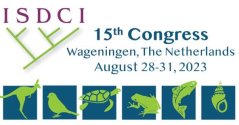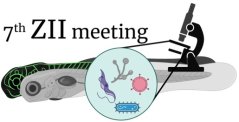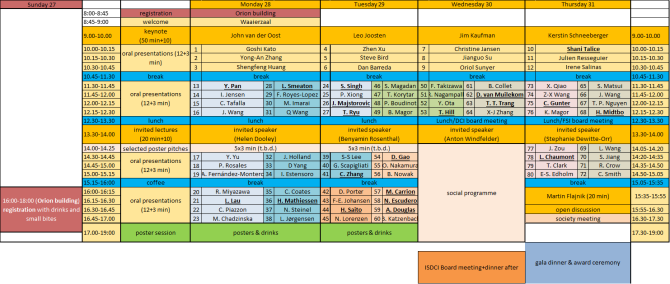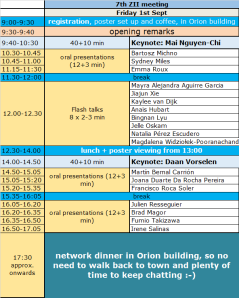
Congress
Joint 15th ISDCI Congress and ZII meeting, August 28 – September 1, 2023
The 15th congress of the International Society of Developmental and Comparative Immunology (ISDCI) was originally scheduled for the summer of 2021, but had to be postponed to 2023 because of the pandemic. For a long time, we planned to have this meeting in Dalian China, but continued and strict regulations regarding the pandemic forced us to anticipate the 16th ISDCI Congress in Dalian China in 2026.
This year ISDCI joins forces with the Zebrafish Infection and Immunity (ZII) meeting, that for the first time will be organized outside the UK. Therefore, we will have an exciting week featuring, the 15th ISDCI Congress from August 28 – 31, followed by the ZII meeting on September 1. You can register for one or both meetings.The meetings will be held in Wageningen, The Netherlands.
The program
the program may still be subject to slight changes. The final schedule of each talk will be communicated to each presented after the 1st of August when we receive confirmation of attendance of all those who submitted an abstract for oral presentation. The length of the talk should not be subject to chance.
Keynote speakers ISDCI
Prof. Dr. Jim Kaufman
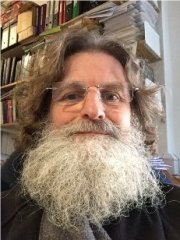
Institute of Immunology and Infection Research, School of Biological Sciences, University of Edinburgh, UK.
Keyword: MHC evolution
Prof. Jim Kaufman has been working on various aspects of the major histocompatibility complex (MHC) for almost 50 years, much of that time trying to understand the evolution of the MHC by studying animals other than humans and mice, particularly chickens. He has worked at Harvard University as a PhD student, the Basel Institute for Immunology as his first independent position, the Institute for Animal Health as the head of the Division of Immunology, the University of Cambridge as the Professor of Comparative Immunogenetics, and now the University of Edinburgh as a Chair of Immunology. He and his group continue to work from genes, genetics and genomics to biochemistry and cell biology, cellular immunology, infection studies and now to population genetics, all to understand the structure, function and evolution of immunity. Recently, people in the group have been studying not only chickens but also passerine birds, Tasmanian devils, rabbits and bats, along with work on T cell receptors, on natural killer receptors and ligands, and on a low-tech high-throughput experimental approach to determining T cell epitopes.
Prof. Dr. Leo Joosten
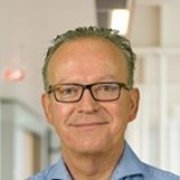
Laboratory of experimental medicine Department of medicine of Radboud University, The Netherlands
Keyword: Trained Immunity
Leo Joosten is head of the Laboratory of Experimental Medicine at Radboud University, Nijmegen, The Netherlands. As pathobiologist he is interested in host defence mechanisms triggered by pathogenic microorganisms causing chronic inflammation such as Borrelia burgdorferi, the causative agent of Lyme disease in humans. He explores the role of Toll-like receptors (TLR), Nod like receptors (NLR), and C-type lectin receptors (CLR) in recognition of pathogens, and the role of the inflammasome and the autophagy machinery in pathogenesis. In his keynote lecture he will summarize the current state of knowledge and application of trained immunity, a long-term functional modification of cells in the innate immune system.
Dr. K. (Kerstin) Schneeberger

Assistant Professor, Hubrecht Institute, The Netherlands Department Clinical Sciences
Internal Medicine of Companion Animals
Keyword: Organoids
Kerstin Schneeberger is Assistant Professor at Utrecht University, working in the field of Stem Cells and Regenerative Medicine. During her PhD at the University Medical Center Utrecht, she acquired extensive expertise in stem cell biology of the gastrointestinal tract, and applied adult stem cell derived organoids as disease models and for regenerative purposes. In her postdoctoral projects at the faculty of Veterinary Medicine, Utrecht University, she combined her expertise in adult stem cell derived organoids with her biotechnological background to develop new organoid technologies, such as bioreactors for large-scale organoid expansion and synthetic hydrogels for clinical applications of organoids. As member of a H2020 consortium, she focuses on whole-organ tissue engineering as an alternative to scarce donor organs for end-stage liver disease patients (OrganTrans). She has published more than 20 papers in high-impact journals and has been awarded with several prestigious research grants and prizes. In her Keynote lecture, she will describe the history of organoids in research and development and present the most recent advances obtained in human and animal (liver) organoid research.
Prof. J. (John) van der Oost
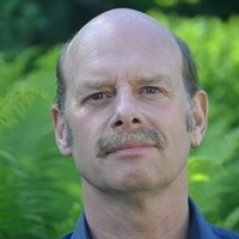
Professor, Wageningen University and Research
Laboratory of Microbiology
Keywords: CRISPR/Cas, bacteria immunity
John van der Oost is professor of Bacterial Genetics in the Laboratory of Microbiology at Wageningen University, The Netherlands. He and his co-workers were the first to demonstrate that the CRISPR-Cas system uses an RNA-guided mechanism to specifically target DNA. Moreover, they demonstrated that an appropriately designed CRISPR can allow for specific targeting of any DNA sequence. His work provided an excellent basis for the development of genome editing tools that currently find applications in biotechnology and molecular medicine. In his keynote he will summarize the current state of knowledge and application of prokaryotic anti-viral defence systems, including CRISPR-Cas and Argonaute.
Keynote speakers ZII
Dr. Mai Nguyen Chi
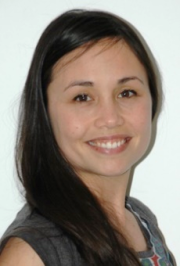
Group Leader at the Laboratory of Pathogens and Host Immunity, at University of Montpellier and CNRS, France
Keyword: Macrophage polarization in zebrafish
As an immunologist, she is interested in how macrophages dynamically adapt their state, behaviour and function during an immune response. From single cells to whole organism, she is tackling this question using a simple model, the transparent zebrafish larva. She developed innovative genetic tools for direct tracking of the dynamics of macrophage polarization during wound healing and infection, showing that macrophage polarization is extremely dynamic. In her keynote lecture she will summarize the current state of knowledge about the macrophage polarization and how it can be subverted during bacterial infections.
Dr. Daan Vorselen
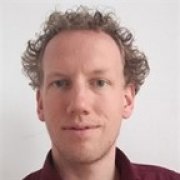
Assistant Professor
Cell Biology and Immunology group Wageningen University and Research, The Netherlands
Keyword: mechanobiology and phagocytic cup shaping in macrophages
Daan Vorselen is Assistant Professor at the Cell Biology and Immunology group of Wageningen university. Throughout his research career Daan worked on a variety of topics, from prediction of population collapse of laboratory yeast colonies, to probing of mechanical properties of extracellular vesicles in blood disorders, to phagocytic behaviour of immune cells. His current work aims to understand rapid and complex immune cell dynamics, and particularly the role of physical forces in shaping these dynamics. He uses a truly interdisciplinary approach, combining development of biophysical methods with quantitative imaging and advanced molecular biology approaches. In his keynote lecture he will present recent results on the dynamics and molecular basis of force generation during phagocytosis.
Conference Location
The ISDCI conference will take place in the Orion building at the Campus of Wageningen University. The address of the Orion building is: Bronland 1, Building nr. 103, 6708WH Wageningen
More information about Wageningen

Travelling to Wageningen, The Netherlands
If you travel to the Netherlands by plane, you will arrive at Schiphol Airport or Eindhoven Airport. From both airports it’s possible to travel to Wageningen by public transport.
Public transport
In order to travel via public transport, we advise you to buy an public transport card at Schiphol service points or at the train stations, called an ‘ov chipkaart’. Please visit the ov chipkaart website to find out how to buy an anonymous or a personalized card. Note, it is no longer possible to pay cash or buy tickets on the train. You can also buy your tickets online at www.ns.nl
Direct trains depart from Schiphol Airport to Ede-Wageningen every 30 minutes. Take the intercity train in the direction of Nijmegen. Your final stop is Ede-Wageningen. Travel time from Schiphol to Ede-Wageningen is approximately one hour.
From station Ede-Wageningen, it’s just a straight bus ride to Wageningen Campus. You can use line C3 or 303 and depart at the Campus/Atlas bus stop. This is less than 5 min walk from the building (approx. 400 m).
If you booked one of the hotels in Wageningen you can take a bus to the centre of Wageningen. Looking to take a taxi? The fare from the railway station to campus is about €30.
We advise to use the 9292 journey planner’s website or app to plan your trip.
More information about travelling from Schiphol Airport to Wageningen can be found here.
More information about travelling from Eindhoven Airport to Wageningen can be found here.
Hotels and accommodation
During the conference you can stay in one of the hotels in Wageningen or the surroundings of Wageningen. Find below suggestions of hotel accommodations in or around Wageningen.
WICC hotel Wageningen

The WICC is your best option for accommodation as it is located 3 km away from the conference location, easy to reach by bike and just 20 minutes by bus or on foot. Just a few minutes behind the hotel, you will find yourself directly in the city centre of Wageningen with its rich history and lots of small restaurants and pubs to find some food during the evenings.
We have pre-booked rooms at the WICC hotel in Wageningen but the number is limited (ONLY 87) so RESERVE AS EARLY AS POSSIBLE AND NO LATER THAN THE 19th OF JUNE after which our discount deal may expire. Rooms will be allocated on a first-come-first-served basis. For general information about the WICC hotel take a look at the website. To book a room go to https://www.wicc.nl/en/online-booking/ and use one of the codes below (enter the code in the "block code" box during the booking):
• Standard Single Room € 105,00 per room per night – code Aqua401293
• Standard Twin Room (used by one person) € 117,50 per room per night – code Aqua599464
• Single Deluxe Room € 114,00 per room per night – code Aqua945620
• Twin Deluxe Room (used by 2 persons) € 162,50 per room per night – code Aqua958925
Above mentioned prices include breakfast but exclude local taxes.
To book another period or another type of room send a message to sales@wicc.nl.
Hotel Reehorst, Ede
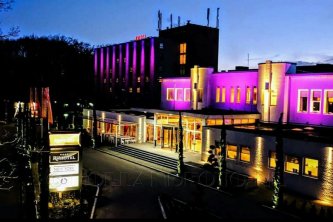
This hotel is your second-best option for accommodation as it is located at 3-minute walk from the train station of Ede-Wageningen, and has a bus stop of the bus leading directly to the campus in Wageningen where the congress will be held. For the evenings, we suggest eating something in one of the many restaurants in Wageningen and catch the bus back to the hotel.
Fletcher Hotel-Restaurant De Wageningsche Berg
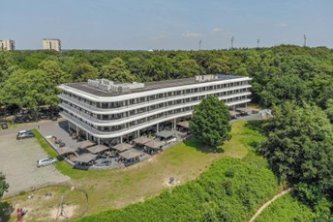
The Fletcher Hotel-Restaurant De Wageningsche Berg is beautifully situated on the Wageningse Berg and offers a view over the river, the floodplains and the Betuwe. Enjoy the natural beauty from the panoramic terrace. The price for a single room for one night lies around 80 euro (excluding breakfast and local taxes). From the Fletcher hotel to the conference location Orion it’s 4 km by bike and 35 minutes by bus.
For more information and to book a room take a look at the website.
Hotel Nol in't Bosch
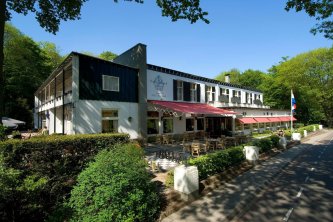
Nol in’t Bosch is beautifully located in the middle of the woods, and it is only 7 minutes’ drive by car to the campus, or 10-15 minutes by bike, but it is not so well connected via public transport. So we advise you to choose this location if you have your own transport or are wiling to ride a bike or walk for 4.4 Km.
Other accommodations in Wageningen
The weather in The Netherlands
Item titel
